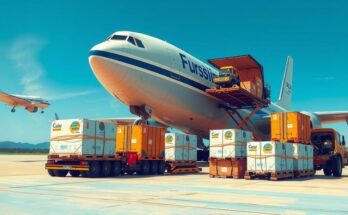Pakistan has sent 35 tonnes of relief supplies to Myanmar following a devastating earthquake. The aid package includes tents, blankets, food, and medicines for the affected population. The earthquake’s aftermath has resulted in significant loss of life, injury, and critical shortages of essential resources, prompting international humanitarian responses.
On the directives of Prime Minister Shehbaz Sharif, the Pakistani government dispatched a relief consignment containing 35 tonnes of supplies to earthquake-affected Myanmar on Tuesday. Minister for Parliamentary Affairs Tariq Fazal Chaudhry oversaw the cargo flight from Islamabad International Airport, according to Radio Pakistan.
The aid shipment comprises essential items such as tents, blankets, tarpaulins, water modules, ready-to-eat meals, and medicines. These supplies are intended for distribution to the relevant authorities upon arrival at Yangon airport.
Following a major earthquake, the reported death toll in Myanmar has reached 2,719, with the chief of the ruling junta, Min Aung Hlaing, suggesting it may surpass 3,000. He confirmed that 4,521 individuals are injured, with 441 still unaccounted for, stemming from the recent 7.7-magnitude quake.
The United Nations Office for the Coordination of Humanitarian Affairs (OCHA) indicated that there is an acute shortage of shelter, clean water, and medical supplies following the earthquake, which has caused extensive infrastructural damage and human suffering.
Reports from Reuters state that the earthquake significantly impaired vital infrastructure, including major roads and bridges. Marcoluigi Corsi, OCHA’s Myanmar Resident and Humanitarian Coordinator, highlighted the urgency of the situation, noting, “The time window for critical search and rescue is narrowing … Shelter, clean water, medicine are in short supply.”
UN agencies are warning of drinking water shortages, raising concerns about potential cholera outbreaks in affected regions. Julia Rees, Unicef’s Deputy Representative, stated that immediate access to water is crucial, saying, “It is really dire — the most immediate need is water, it is super hot out there…Water pipes and septic tanks have broken.”
The World Health Organization reported that hospitals are overwhelmed and facing serious shortages of medical supplies, running water, and fuel. The UNHCR has classified the situation as a humanitarian crisis and is mobilizing response efforts including plastic sheets, and sleeping materials.
Response efforts have been hampered by severe infrastructural damage, with reports indicating that a journey from Yangon to Mandalay—normally eight hours—has now taken UNHCR teams 13 hours to complete. Babar Baloch, a UNHCR representative, emphasized, “The most urgent requirements is shelter and relief items … there is also the risk of explosive ordnance – due to the last four years of active conflict.”
In summary, Pakistan has promptly responded to the earthquake crisis in Myanmar by dispatching substantial relief supplies. The aftermath of the 7.7 magnitude earthquake has led to an urgent humanitarian crisis characterized by a significant death toll, infrastructure damage, and acute shortages of essential resources. Various UN agencies are actively addressing the dire needs for water, shelter, and medical assistance amid challenging conditions.
Original Source: www.thenews.com.pk




